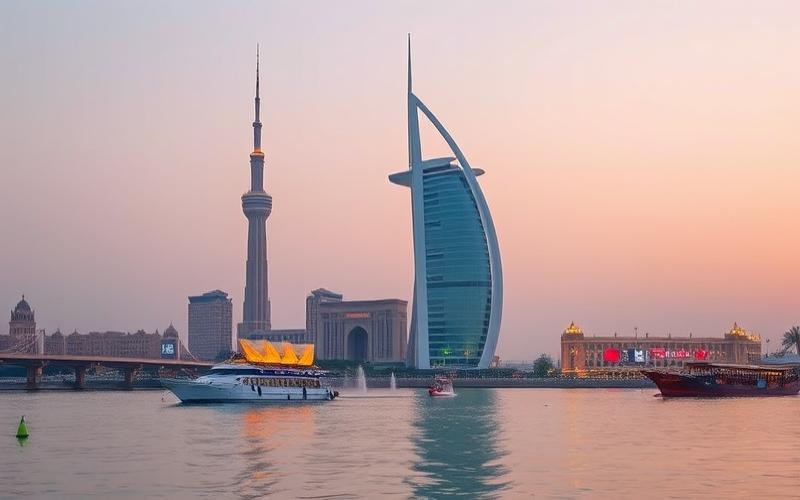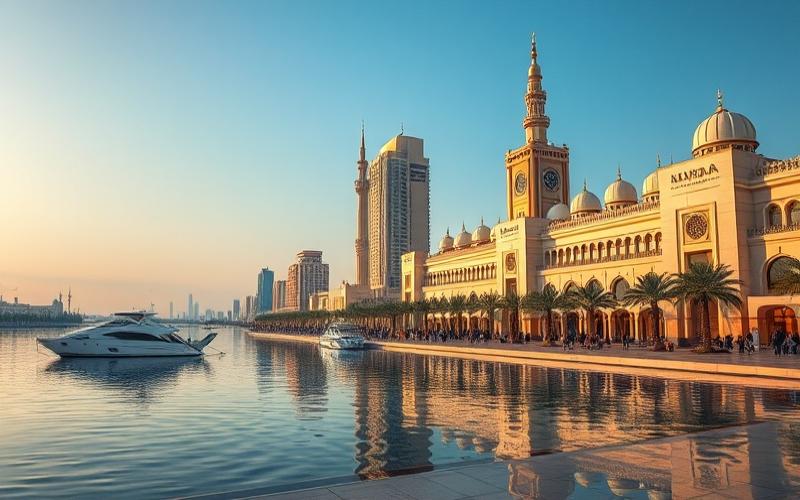
 Published on and written by Cyril Jarnias
Published on and written by Cyril Jarnias
Dubai, the jewel of the United Arab Emirates, has become a premier destination for entrepreneurs worldwide. With its dynamic economy, favorable taxation, and strategic position, the city offers fertile ground for business. However, to succeed in this competitive environment, choosing the right legal structure for your company is crucial. This choice will not only influence your mode of operation but also your legal and tax obligations. In this article, we will explore the different options available to you and guide you through this crucial decision.
Main Legal Structures for a Company in Dubai
Dubai offers a variety of legal structures for businesses, each with its own advantages and specificities. Here are the main options to consider:
1. Limited Liability Company (LLC)
The LLC is one of the most popular legal forms in Dubai. It offers considerable flexibility and limited liability for its owners. The main characteristics of an LLC in Dubai are:
- A minimum of 2 and a maximum of 50 shareholders
- Shareholders’ liability is limited to their capital contribution
- 51% of shares must be held by a UAE national (with some recent exceptions)
- Suitable for most commercial and professional activities
The LLC is particularly suited to businesses planning to operate primarily in the local UAE market. It allows for great flexibility in management and offers personal protection for owners.
2. Free Zone Company (FZC/FZCO)
Dubai’s free zones offer unique advantages to foreign investors. A free zone company can take the form of a Free Zone Company (FZC) or a Free Zone Establishment (FZE). The main characteristics are:
- 100% foreign ownership allowed
- Full exemption from corporate and income taxes
- Full repatriation of profits and capital
- No need for a local sponsor
These companies are ideal for those seeking to benefit from full ownership and tax advantages while having access to international markets. However, they have restrictions for operating directly in the local UAE market.
3. Branch of a Foreign Company
For foreign companies wishing to establish a presence in Dubai without creating a separate legal entity, the branch is a viable option. Its characteristics include:
- Legal extension of the parent company
- Can conduct the same activities as the parent company
- Requires a local service agent
- No minimum capital required
This structure is particularly useful for multinational companies looking to expand their operations to Dubai while maintaining direct control from their headquarters.
Good to know:
The choice between LLC, free zone company, and branch largely depends on your business objectives, target market, and need for operational flexibility. Each structure offers unique advantages in terms of ownership, taxation, and ease of operation.
Sole Proprietorship or Company: Which Option to Choose?
The decision between creating a sole proprietorship or a company in Dubai is crucial and depends on several factors. Let’s examine the advantages and disadvantages of each option:
Sole Proprietorship: Simplicity and Total Control
The sole proprietorship, known as “Sole Proprietorship” in Dubai, is the simplest form of business. It has the following characteristics:
- Total ownership and control by a single individual
- Simplified creation process and reduced costs
- Flexibility in decision-making
- Unlimited personal liability of the owner
This structure is particularly suitable for individual entrepreneurs, consultants, or small service businesses. However, unlimited personal liability is a significant risk factor to consider.
Company: Enhanced Protection and Credibility
Opting for a company structure, such as an LLC or FZC, offers several advantages:
- Limited liability for shareholders
- Greater credibility with clients and partners
- Ability to attract investors
- Better opportunities for growth and expansion
Companies are generally preferred for businesses with significant growth ambitions, requiring substantial investments, or operating in high-risk sectors.
Factors to Consider in Your Choice
To make the best decision, evaluate the following aspects:
- Size and ambitions of your business
- Risk level of your activity
- Financing and investment needs
- Complexity of management and legal obligations
- Taxation and financial benefits
It is crucial to carefully weigh these factors based on your specific situation and long-term goals. Consultation with a legal expert or business advisor can prove valuable in this decision-making process.
Good to know:
While the sole proprietorship offers simplicity and total control, the company structure brings enhanced legal protection and credibility, essential for long-term growth and attracting investors in Dubai.
Tax Benefits According to Legal Structure
One of the most attractive aspects of doing business in Dubai is its favorable tax regime. However, tax benefits can vary depending on the chosen legal structure. Here’s an overview of the main tax benefits for each type of entity:
Free Zone Companies: The Tax Haven
Companies established in Dubai’s free zones benefit from exceptional tax advantages:
- Full corporate tax exemption for 50 years (renewable)
- No personal income tax
- Customs duty exemption for imports and exports
- 100% repatriation of profits and capital
These advantages make free zones a very attractive option for internationally-oriented businesses or those seeking to optimize their taxation.
Limited Liability Companies (LLC): A Tax Balance
LLCs in Dubai also benefit from a favorable tax environment, although slightly different from free zones:
- No corporate tax at the federal level (except for banks and oil companies)
- No personal income tax
- 5% VAT on most goods and services
- Possibility to benefit from UAE double taxation treaties
LLCs are particularly advantageous for businesses wishing to operate directly in the local UAE market while benefiting from a favorable tax regime.
Branches and Representative Offices: Specific Tax Considerations
For branches and representative offices, tax treatment largely depends on the nature of their activities and the tax agreements between the UAE and the parent company’s country of origin:
- Generally subject to the same tax regime as LLCs
- Possibility to benefit from international tax treaties
- Need to maintain separate accounting for Dubai operations
It is crucial to note that the tax landscape in Dubai and the UAE is evolving. For example, the recent introduction of a 9% corporate tax on profits exceeding 375,000 AED (approximately 102,000 USD) starting June 2023 marks a significant change. However, many exemptions and tax incentives remain in place, particularly for small businesses and start-ups.
Good to know:
Although Dubai offers a generally advantageous tax environment, the choice of legal structure can have a significant impact on your tax obligations. Free zone companies offer the most significant tax benefits, while LLCs and branches benefit from a favorable tax regime with some nuances.
Registration Process and Associated Costs
The process of registering a company in Dubai varies depending on the type of legal structure chosen. Understanding these steps and the associated costs is crucial for effectively planning your establishment.
LLC Registration
The process of registering an LLC in Dubai generally includes the following steps:
- Choose and reserve a trade name
- Prepare incorporation documents (articles of association, memorandum)
- Obtain initial approval from the Department of Economic Development (DED)
- Find a local sponsor (if required)
- Rent office space
- Obtain the commercial license
- Name reservation fees: 600-2000 AED
- License fees: starting from 10,000 AED
- Local sponsor fees: variable, often a percentage of profits
- Office rental: depends on location and size
Establishing a Free Zone Company
Registration in a free zone follows a slightly different process:
- Choose a free zone suitable for your activity
- Submit an application to the free zone authority
- Obtain initial approval
- Prepare incorporation documents
- Rent office space in the free zone
- Obtain the license
- Application fees: 1000-5000 AED
- License fees: 15,000-50,000 AED (varies by zone)
- Office rental: generally higher than on the mainland
- Visa fees: approximately 3000 AED per visa
Establishing a Branch
To establish a branch, the process involves:
- Obtain approval from the Ministry of Economy
- Appoint a local service agent
- Obtain a commercial license from the DED
- Rent office space
- License fees: similar to those of an LLC
- Local service agent fees: variable
- Bank guarantee: often required, variable amount
It is important to note that these costs are indicative and may vary depending on factors specific to your business. Additionally, additional fees may apply for professional services such as accounting, auditing, and legal services.
Good to know:
The registration process in Dubai may seem complex, but it is generally faster and simpler than in many other countries. Costs vary considerably depending on the type of entity and the chosen zone, with free zone companies tending to have higher initial costs but offering more long-term benefits.
Legal and Regulatory Obligations
Understanding and complying with legal and regulatory obligations is crucial for operating successfully in Dubai. These obligations vary depending on the type of legal entity and the sector of activity.
General Requirements for All Businesses
Regardless of the chosen structure, certain obligations are common to all businesses in Dubai:
- Annual renewal of the commercial license
- Maintenance of accounting and financial records
- Compliance with UAE labor laws for hiring employees
- Compliance with health and safety regulations
- Adherence to consumer protection and competition laws
Specific Obligations for LLCs
LLCs in Dubai have additional obligations:
- Maintenance of minimum capital (varies by activity)
- Holding annual general meetings of shareholders
- Appointment of an external auditor for companies exceeding certain revenue thresholds
- Compliance with Emiratisation quotas (employment of UAE citizens) for certain industries
Regulations for Free Zone Companies
Free zone companies must adhere to specific rules:
- Compliance with regulations specific to each free zone
- Limitations on commercial activities outside the free zone
- Obligation to maintain a physical office in the zone
- Submission of periodic reports to the free zone authority
Requirements for Branches
Branches of foreign companies have particular obligations:
- Appointment of a local service agent
- Submission of parent company financial statements
- Obtaining specific approvals for certain activities
It is crucial to note that regulations in Dubai are regularly evolving to align with international best practices. For example, the recent introduction of corporate tax and changes in foreign business ownership laws illustrate this dynamic.
Additionally, certain sectors, such as finance, insurance, and healthcare services, are subject to additional regulations and require special licenses.
Good to know:
Although Dubai is renowned for its ease of doing business, compliance with legal and regulatory obligations is paramount. These obligations vary significantly depending on the type of entity and the sector of activity. It is highly recommended to consult local experts to ensure full compliance.
Conclusion: Making the Right Choice for Your Business in Dubai
Choosing the right legal structure for your business in Dubai is a crucial decision that will significantly impact your long-term success. Each structure – whether an LLC, a free zone company, a branch, or a sole proprietorship – presents its own advantages and challenges.
Key factors to consider include:
- Your long-term business goals
- The level of control and ownership you wish to maintain
- Your target market (local, regional, or international)
- Your financing and investment needs
- The tax implications of each structure
- Regulatory requirements and associated costs
It is important to note that the business landscape in Dubai is constantly evolving. Recent reforms, such as the permission for 100% foreign ownership in certain sectors and the introduction of new tax regulations, demonstrate Dubai’s commitment to remaining an attractive destination for international investors.
Before making your final decision, it is highly recommended to:
- Conduct thorough market research
- Consult local legal and tax experts
- Consider the short and long-term implications of your choice
- Remain flexible and open to future adaptations of your structure
Ultimately, the success of your business in Dubai will depend not only on the chosen legal structure but also on your understanding of the local market, your ability to navigate the regulatory environment, and your aptitude for seizing the unique opportunities offered by this dynamic city.
Good to know:
The choice of legal structure is not an irreversible decision. As your business evolves, it is possible to modify its structure to adapt to new objectives or market changes. The key is to remain informed and adaptable in this dynamic business environment.
Disclaimer: The information provided on this website is for informational purposes only and does not constitute financial, legal, or professional advice. We encourage you to consult qualified experts before making any investment, real estate, or expatriation decisions. Although we strive to maintain up-to-date and accurate information, we do not guarantee the completeness, accuracy, or timeliness of the proposed content. As investment and expatriation involve risks, we disclaim any liability for potential losses or damages arising from the use of this site. Your use of this site confirms your acceptance of these terms and your understanding of the associated risks.















